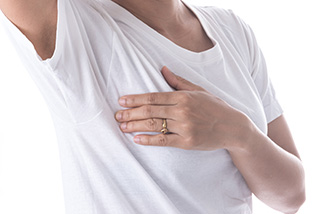In general, women who have had children have a lower risk of breast cancer compared to women who have never given birth. However, new research has found that moms don’t experience this breast cancer protection until many years later and may face elevated risk for more than 20 years after their last pregnancy.

The study suggests breast cancer protection from pregnancy may not begin until as many as 30 years after the last pregnancy.
(Photo courtesy of NIEHS)
Scientists at the National Institutes of Health, along with members of the international Premenopausal Breast Cancer Collaborative Group, found breast cancer risk increases in the years after a birth, with the highest risk of developing the disease about five years later. The findings, which appeared online in the Annals of Internal Medicine, suggest breast cancer protection from pregnancy may not begin until as many as 30 years after the birth of the last child.
According to senior author Dale Sandler, Ph.D., head of the Epidemiology Branch at the National Institute of Environmental Health Sciences (NIEHS), part of NIH, a few prior studies reported an increase in breast cancer risk after childbirth. However, most of what researchers knew about breast cancer risk factors came from studies of women who have gone through menopause. Since breast cancer is relatively uncommon in younger women, it is more difficult to study.
Researchers combined data from approximately 890,000 women from 15 long-term studies across three continents, to understand the relationship between recent childbirth and breast cancer risk in women age 55 and younger.
"We were surprised to find that an increase in breast cancer risk lasted for an average of 24 years before childbirth became protective," said Sandler. "Before this study, most researchers believed that any increase in risk lasted less than 10 years."
The scientists also found that the association between recent childbirth and breast cancer risk was stronger for women who were older at first birth, had more births, or had a family history of breast cancer. Breastfeeding did not appear to have any protective effect, even though it is generally thought to reduce breast cancer risk. Many of these additional factors were not addressed in earlier studies, underscoring the statistical power of this larger project.
Sandler and first author Hazel Nichols, Ph.D., of the University of North Carolina Lineberger Comprehensive Cancer Center, started the study when Nichols was a research fellow at NIEHS. Nichols explained that childbirth is an example of a risk factor that is different for younger women than older women.
"This difference is important because it suggests that we may need to develop tools for predicting breast cancer risk that are specific to young women," Nichols said. "Doing so would help women talk to their health care providers about when they should start mammography screening."
Nichols and Sandler both stressed the importance of keeping these findings in perspective. Breast cancer is uncommon in young women. An increase in the relative risk of breast cancer in women under age 55 translates to a very small number of additional cases of breast cancer per year.
Anthony Swerdlow, D.M., D.Sc., Ph.D., and Minouk Schoemaker, Ph.D., scientists at the Institute of Cancer Research, London, co-led the study with Sandler and Nichols.
Grant Numbers:
Z01ES044005
UM1CA176726
UM1CA186107
UM1CA164974
R01CA058420
R01CA092447
P50CA168504
KL2TR001109
Reference: Nichols HB, Schoemaker MJ, Cai J, Xu J, Wright LB, Brook MN, Jones ME, Adami H-O, Baglietto L, Bertrand KA, Blot WJ, Boutron-Ruault M-C, Dorronsoro M, Dossus L, Eliassen AH, Giles GG, Gram IT, Hankinson SE, Hoffman-Bolton J, Kaaks R, Key TJ, Kitahara CM, Larsson SC, Linet M, Merritt MA, Milne RL, Pala V, Palmer JR, Peeters PH, Riboli E, Sund M, Tamimi RM, Tjonneland A, Trichopoulou A, Ursin G, Vatten L, Visvanathan K, Weiderpass E, Wolk A, Zheng W, Weinberg CR, Swerdlow AJ, Sandler DP. 2018. Breast cancer risk after recent childbirth: A pooled analysis of 15 prospective studies. Ann Intern Med; doi: 10.7326/M18-1323 [Online 11 December 2018].


